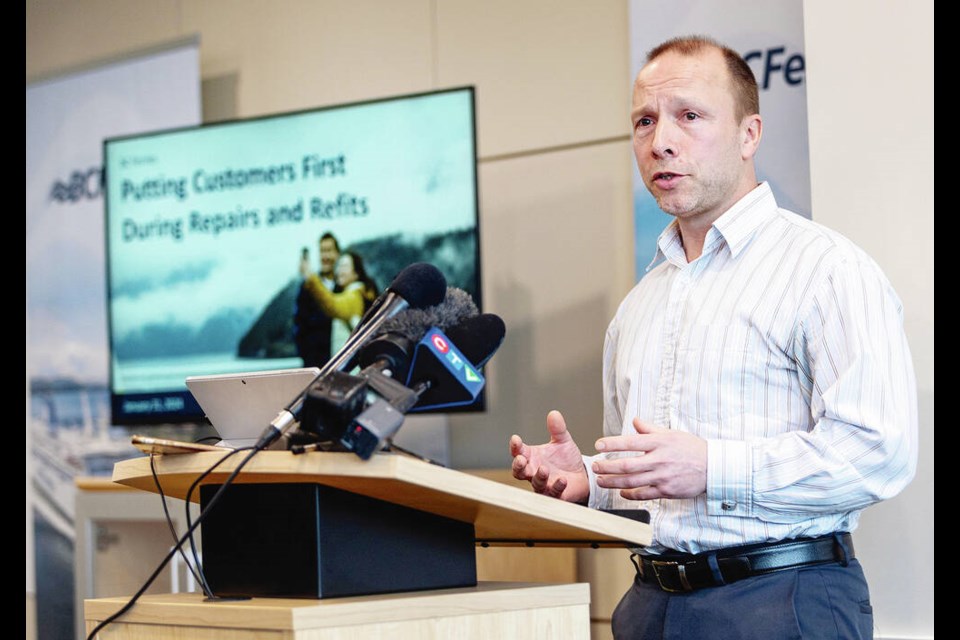B.C. Ferries is optimistic the upcoming summer season won’t see a repeat of disruptions seen last year, which sidelined major vessels and disrupted plans for travellers.
“We are looking forward to having all of our major vessels back in service, ready to go, reliable for the summer,” vice-president of engineering Stephen Jones said Wednesday.
But while B.C. Ferries refines its vessel repairs and sailing schedules, the ongoing issue of crew shortages remains. Transport Canada requires a certain number of crew members with specific skills on each vessel before it is allowed to sail.
The past few years have seen ferries remain at the dock many times due to a lack of crew. The company is trying to rectify the problem at the same time the union representing workers seeks higher pay to match other employers in the sector, who have been hiring some of the company’s employees. An arbitration hearing is set for early this month.
All three Coastal-class ferries are slated to be in service between Â鶹´«Ã½Ó³»Island and the Lower Mainland following significant mechanical work.
Coastal-class ferries were taken out of service several times last year due to mechanical problems. Losing the major vessels — each of which can carry just over 1,600 passengers and crew — during peak travelling season caused frustrating backlogs.
Each Coastal ferry is getting new rotors. The 526-foot Coastal Renaissance — which has not sailed since mid-August — is expected to return to service in March after engine work and a refit.
Coastal Celebration will be in refit March to April and Coastal Inspiration will be in refit from April to May.
The rotating parts of the electric motor have a service life of approximately 30,000 starts, Jones said.
Coastal Inspiration has the highest number, with about 38,000. The other two are in the same ballpark, he said.
After the Coastal ferries entered service, B.C. Ferries found that each had a “pretty serious vibration issue caused by running the inshore propellers with the vessel in docks,” he said.
As a result, a decision was made soon after the Coastal ferries came into service to stop running that inshore propeller to avoid noise and vibration damage to terminals. That resulted in more starts.
The decision cut the operational life of those vessels, which Jones said have been “reliable workhorses,” since joining the fleet in 2007 and 2008.
The company is installing variable-speed drive systems in each Coastal ferry.
“That will ensure that these rotors will take each vessel to the end of its life.”
B.C. Ferries has reworked its refit schedule for its vessels, ensuring they take place between Thanksgiving and May, leaving June and subsequent summer months free.
Compressing the refit schedule “puts extra pressure on our system in terms of maintenance but provides better service and better reliability for the customer,” Jones said.
A total of 20 refits are scheduled this year for 15 major ferries, two intermediate-sized ferries and three minor vessels. Major vessels undergo annual refits. The average cost of a refit is $4.7 million.
Refits on major ferries typically take 30 to 90 days.
B.C. Ferries is in the process of standardizing its fleet, aiming to pare down the 14 classes of ferries to five or six to create more efficiencies.
The corporation is carrying out a visioning process to chart its future, looking at potential future demand, population projections, travel patterns, economic development, and movement of goods and services, said Brian Anderson, vice-president of strategy and planning.
Last year, B.C. Ferries carried just over 20 million passengers on 25 routes, tallying up to about 123,000 sailings.
“We are all very excited to welcome record numbers of customers to the coast this summer,” Anderson said.
>>> To comment on this article, write a letter to the editor: [email protected]



